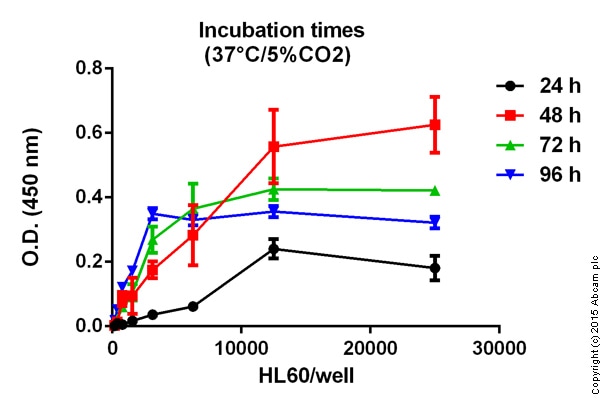WST-1 Assay Kit (Cell Proliferation) (ab65475)
Key features and details
- Assay type: Quantitative
- Detection method: Colorimetric
- Platform: Microplate reader
- Assay time: 4 hr
- Sample type: Adherent cells, Suspension cells
Overview
-
Product name
WST-1 Assay Kit (Cell Proliferation)
See all Cell viability/proliferation kits -
Detection method
Colorimetric -
Sample type
Adherent cells, Suspension cells -
Assay type
Quantitative -
Assay time
4h 00m -
Product overview
WST-1 Assay Kit ab65475 is an alternative version of ab65473, our most popular WST-1 Assay Kit (which is also supplied as a ready-to-use reagent ab155902). This kit uses a different WST-1 analog, and also contains a stop solution.
The WST-1 assay provides by far the easiest and most sensitive means for performing a quantitative cell proliferation assay, cell viability assay, or cytotoxicity assay in mammalian cells.
The WST-1 assay protocol is based on the cleavage of the tetrazolium salt to formazan by cellular mitochondrial dehydrogenase. The amount of the dye generated by activity of dehydrogenase is directly proportional to the number of living cells. The formazan dye produced by viable cells can be quantified by microplate reader by measuring the absorbance of the dye solution at 440 nm.
The WST-1 assay protocol is very simple:
- add the WST-1 assay reagent to the cell culture media and incubate for between 0.5 and 4 hrs
- shake the plate to mix the contents
- analyze the amount of formazan dye produced by measuring the absorbance at 440 nm
This kit contains an optional stop solution to stop the production of formazan dye. -
Notes
This kit was previously called Quick Cell Proliferation Assay Kit II, and WST-1 Cell Proliferation Assay Kit.
The WST-1 assay is add-and-read, and requires no washing, harvesting, or solubilization steps. It is faster, stable, and more sensitive than MTT, XTT, MTS based assays. The assay correlates well with the [3H]-thymidine incorporation assay.
Review our cell health assays guide to learn more about our other cell viability, cytotoxicity and cell proliferation assay kits.
Abcam has not and does not intend to apply for the REACH Authorisation of customers’ uses of products that contain European Authorisation list (Annex XIV) substances.
It is the responsibility of our customers to check the necessity of application of REACH Authorisation, and any other relevant authorisations, for their intended uses. -
Platform
Microplate reader
Properties
-
Storage instructions
Store at -20°C. Please refer to protocols. -
Components 500 tests 2500 tests Electro Coupling Solution (ECS) 1 x 5ml 1 x 25ml Stop Solution 1 x 5ml 1 x 25ml WST Reagent (lyophilized) 1 vial 1 vial -
Research areas
-
Relevance
Cell proliferation is the multiplication or reproduction of cells, as a result of cell growth and cell division, resulting in the expansion of a cell population. -
Alternative names
- Cell Cytotoxicity
- cell tracking
Images
-
Mitochondrial dehydrogenases checked in various cell concentrations at different incubation times (2h WST for each condition)
-
HL60 cell proliferation measured after 24h incubation (37°C/5%CO2) and 2h WST at various camptothecin concentrations
-
HL60 cell proliferation measured after 48h incubation (37°C/5%CO2) and 2h WST at various camptothecin concentrations
-
HL60 cell proliferation measured after 72h incubation (37°C/5%CO2) and 2h WST at various camptothecin concentrations















